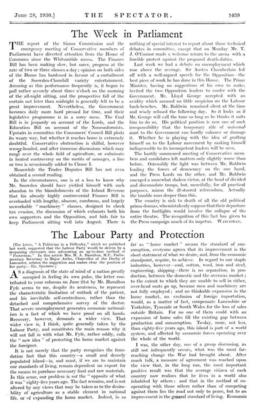The Week in Parliament T HE report of the Simon Commission
and the emergency meeting of Conservative members of Parliament have diverted attention from the House of Commons since the Whitsuntide recess. The Finance Bill has been making slow, but surer, progress at the rate of two or three clauses a day ; opinion on both sides of the House has hardened in favour of a curtailment of the Snowden-Churchill variety entertainment. Amusing as this performance frequently is, it began to pall rather severely about three o'clock on the morning of the all-night sitting, and the prospective fall of the curtain not later than midnight is generally felt to be a great improvement. Nevertheless, the Government becomes daily more hard pressed for time, and their legislative programme is in a sorry mess. The Coal Bill is in jeopardy on account of the Lords, and the Education Bill on account of the Nonconformists. Upstairs in committee the Consumers' Council Bill plods its weary way, but whether it reaches home is extremely doubtful. Conservative obstruction is skilful, however wrong-headed, and after immense discussions which may range over the whole field of agriculture, or culminate in heated controversy on the merits of sausages, a line or two is occasionally added to Clause I.
Meanwhile the Trades Disputes Bill has not even obtained a second reading.
In the circumstances, one is at a loss to know why Mr. Snowden should have yielded himself with such abandon to the blandishments of the Inland Revenue that his already highly controversial Finance Bill is overloaded with lengthy, obscure, cumbrous, and largely unworkable " machinery " clauses, designed to check tax evasion, the discussion of which exhausts both his own supporters and the Opposition, and bids fair to keep Parliament sitting well into August. There is nothing of special interest to report about these technical debates in committee, except that on Monday Mr. T. J. O'Connor made a welcome return to the arena with a forcible protest against the proposed death-duties.
Last week we had a debate on unemployment which rose above the average. Sir Austen Chamberlain led off with a well-argued speech for the Opposition—the best piece of work he has done in this House. The Prime Minister, having no suggestions of his own to make, invited the two Opposition leaders to confer with the Government. Mr. Lloyd George accepted with an avidity which aroused no little suspicion on the Labour back-benches. Mr. Baldwin remained silent at the time and wisely refused the following day. So it looks as if Mr. George will call the tune so long as he thinks it suits him to do so. His political position is now one of such irresponsibility that the temporary role of universal aunt to the Government can hardly enhance or damage it. Whether he is playing with the idea of grafting himself on to the Labour movement by making himself indispensable to its incompetent leaders will be seen.
The hastily summoned meeting of Conservative mem- bers and candidates left matters only slightly worse than before. Ostensibly the fight was between Mr. Baldwin leading the forces Of democracy on the one hand, and the Press Lords on the other, and Mr. Baldwin emerged a somewhat shaken victor, at the head of divided and disconsolate troops, but, mercifully, for all practical purposes, minus the ill-starred referendum. Actually the trouble runs deeper than this.
The country is sick to death of all the old political prima-donnas, who mistakenly suppose that their departure from the footlights would involve the collapse of the entire theatre. The recognition of this fact has given to the Press campaign much of its impetus. WATCHMAN.


















































 Previous page
Previous page